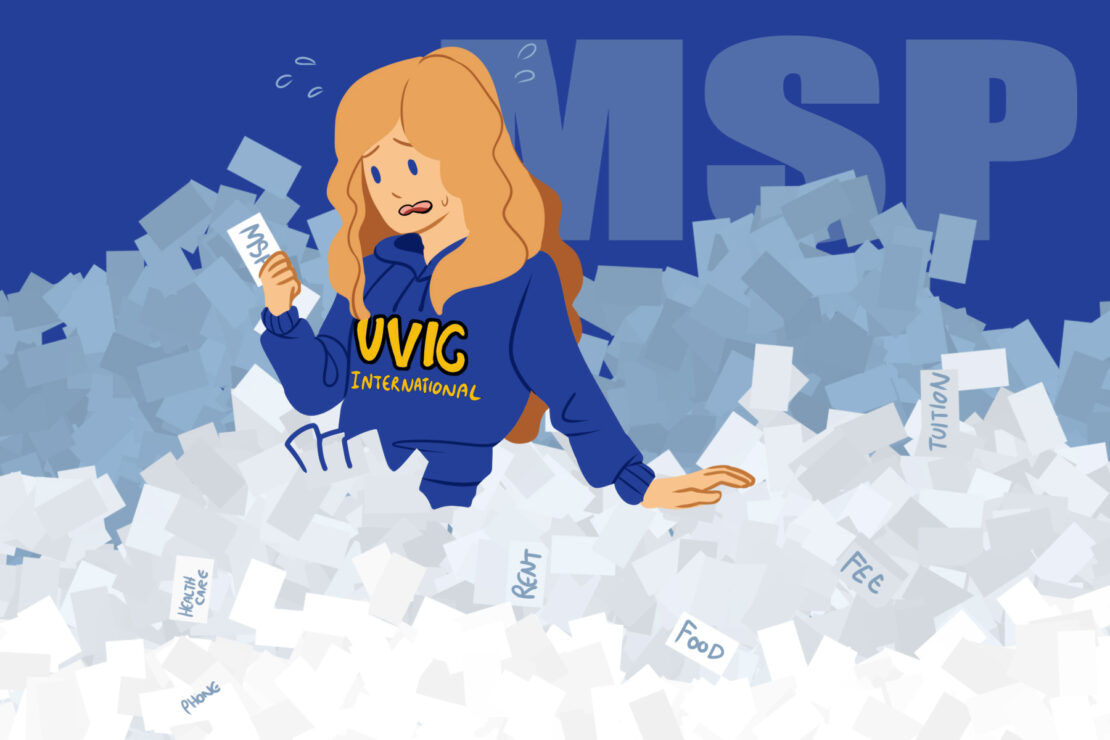Monthly premium of $75 is a financial barrier for international students

The B.C. government’s Medical Services Plan (MSP) premium is a major stressor for international students. Many international students, including myself, are not comfortable with the high $75 monthly premium for public provincial health care. We feel singled out and betrayed by the government.
On Jan. 1, 2020, the monthly premium for MSP doubled from $37.50 to $75, resulting in extreme stress and pressure for many international students. As a result of this policy change, there was thundering outcry by advocacy groups for international students. For UVic international students, the UVSS advocated against this MSP hike. They even made a petition to completely eliminate international students’ MSP fees. However, as of the time of writing, nothing has come out of these efforts.
A 2018 report published by the B.C. government states that in 2017 the enrollment of international students in post-secondary grew from five per cent to 14 per cent, while domestic students decreased from 95 per cent to 86 per cent. Moreover, this report emphasizes the significance of international students’ contribution to the economy through higher tuition fees and their living expenses. A 2015 Canadian Bureau of International Education (CBIE) survey found out that about 51 per cent of international students aim to become permanent residents after they graduate.
Despite the economic contributions of international students, little is being done by the B.C. government to pay them back. Instead, we are bombarded with inflated tuition fees and a doubled monthly premium of MSP.
If the UVSS lobbying effort to abolish the $75 fee becomes successful, then international students can use it for other essentials like fuel, groceries, and rent.
Although I fully agree with the elimination of MSP fees that the UVSS proposed, even reverting back to the $37.50 monthly premium would be an improvement. This reduced MSP fee is much more affordable, and could mean an international student won’t have to make the hard decision to skip a meal or two.
Moreover, the inequity towards international students rises when considering that work permit holders, permanent residents, and Canadian citizens do not have to pay a dime for their public health insurance. International students are getting the short end of the stick from the B.C. government.
International students can only work part-time during semesters, about 20 hours a week off-campus, so many can barely make ends meet as it is. The doubling of the MSP fee is just another financial hurdle for us. The more these barriers increase, the more difficult it becomes for us to be able to afford the extra costs that come with a Canadian education.
On top of all of this, the MSP fee increase came just before the first wave of the pandemic. During the start of the pandemic, jobs were hard to come by all over Canada, so it was hard for international students to pay their phone bills, rent, and tuition fees. The increased MSP fee was an additional burden.
Canada is renowned for its free universal healthcare system all around the world. This perspective is quite distorted as Canadian healthcare is not free for international students. It should not matter where you come from, if you are living within the boundaries of B.C., regardless of what your immigration status is, there should be no MSP or healthcare premiums for you. Universal healthcare is only universal if it applies to everyone.
The B.C. government should take inspiration from the Government of Saskatchewan, where basic public healthcare is free for everyone — including international students. If the Saskatchewan government can make healthcare free for international students, so can the B.C. government. If the B.C. government is thinking long-term, I think introducing this new policy would help them recover the international students’ enrollment deficit caused by the COVID-19 pandemic.
International students have been left in the dark. If nothing is done about high MSP fees, then inequity has triumphed equity.






